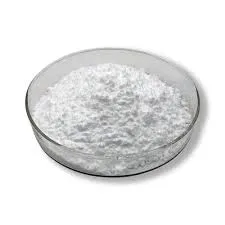
Nov . 30, 2024 12:26 Back to list
Understanding Hydroxyethyl Cellulose and Its Applications in Various Industries
What is Hydroxyethyl Cellulose?
Hydroxyethyl cellulose (HEC) is a non-ionic, water-soluble polymer derived from natural cellulose. As a derivative of cellulose, which is a fundamental component of the plant cell wall, HEC is synthesized by the etherification of cellulose with ethylene oxide. This modification introduces hydroxyethyl groups into the cellulose structure, providing it with unique properties that make it valuable in a wide range of industrial and commercial applications.
HEC is primarily recognized for its thickening, emulsifying, and film-forming properties, which contribute to its widespread use in industries such as cosmetics, pharmaceuticals, construction, and food products. Its versatility is one of the key reasons why HEC has become a popular ingredient in many formulations.
Applications of Hydroxyethyl Cellulose
1. Cosmetics and Personal Care In the cosmetics industry, HEC is widely used in formulations for lotions, creams, shampoos, and gels due to its ability to impart viscosity and stability to products. It helps in creating a smooth texture, improving the spreadability of creams on the skin and enhancing the overall sensory experience. Moreover, HEC acts as a binder and stabilizer for emulsions, helping to maintain the integrity of formulations over time.
2. Pharmaceuticals Hydroxyethyl cellulose is also utilized in the pharmaceutical sector as a binder in tablet formulations, a thickener in suspensions, and a film-forming agent in controlled-release drug delivery systems. Its biocompatibility and non-toxicity make it an ideal excipient. Additionally, HEC is used in ophthalmic solutions due to its excellent ability to retain moisture and its compatibility with various active ingredients.
3. Construction In construction, HEC is commonly added to cement-based products such as mortars and plasters to enhance workability and improve adhesion. It acts as a thickening agent and can help reduce water absorption, allowing for better control over the application of materials and improving the overall performance of the construction products.
what is hydroxyethyl cellulose

4. Food Industry In the food industry, hydroxyethyl cellulose serves as a food additive, where it functions as a thickener, stabilizer, and emulsifier. Its ability to maintain texture and improve mouthfeel makes it popular in products such as sauces, dairy products, and baked goods.
Environmental and Safety Considerations
One of the advantages of hydroxyethyl cellulose is its biodegradability and environmental safety. As a cellulose derivative, it is derived from a renewable resource, making it a more sustainable option compared to many synthetic polymers. Additionally, HEC is generally recognized as safe (GRAS) when used in food products, which adds to its appeal across various industries.
Despite its numerous benefits, it is essential to consider the concentrations and applications in which HEC is used. While it is generally safe, excessive use in certain applications may lead to adverse effects, and manufacturers must adhere to regulatory standards to ensure consumer safety.
Conclusion
Hydroxyethyl cellulose is a remarkable compound that bridges the gap between nature and technology. Its unique properties, derived from its cellulose base, lend themselves to a plethora of applications that significantly enhance product performance across multiple industries. Whether it is providing texture to a luxurious facial cream, contributing to the stability of a pharmaceutical product, improving the workability of construction materials, or enhancing the quality of food products, HEC plays an essential role in modern formulations.
As industries continue to evolve and demand innovative solutions, hydroxyethyl cellulose is likely to remain a critical ingredient in the toolbox of formulators, offering practical and effective solutions for enhancing the functionality and quality of countless products. With ongoing research and development, we may see even more applications and improvements in HEC technology, further solidifying its place in the world of materials science.
-
Versatile Hpmc Uses in Different Industries
NewsJun.19,2025
-
Redispersible Powder's Role in Enhancing Durability of Construction Products
NewsJun.19,2025
-
Hydroxyethyl Cellulose Applications Driving Green Industrial Processes
NewsJun.19,2025
-
Exploring Different Redispersible Polymer Powder
NewsJun.19,2025
-
Choosing the Right Mortar Bonding Agent
NewsJun.19,2025
-
Applications and Significance of China Hpmc in Modern Industries
NewsJun.19,2025







